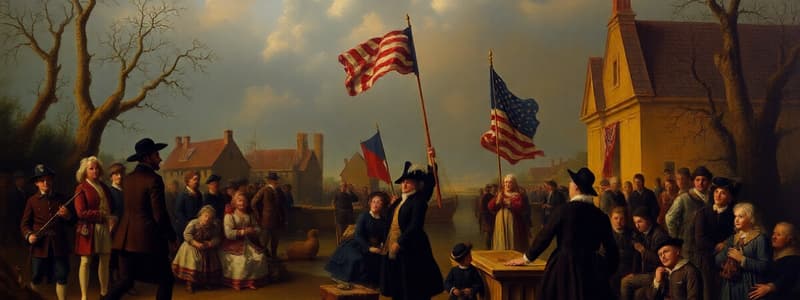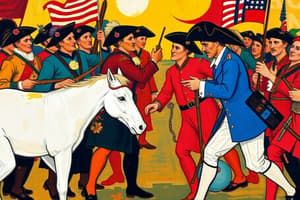Podcast
Questions and Answers
What was the primary purpose of the colonial boycotts?
What was the primary purpose of the colonial boycotts?
- To increase the demand for British goods
- To demonstrate colonial unity and opposition to unjust taxation (correct)
- To force the British government to impose new taxes
- To promote economic growth in the colonies
What was the key argument made in the 'Letters from a Farmer in Pennsylvania'?
What was the key argument made in the 'Letters from a Farmer in Pennsylvania'?
- The British government should impose stricter regulations on colonial trade.
- The colonists should declare independence from Britain.
- The Stamp Act was a violation of colonial rights. (correct)
- The colonists should remain loyal to the British Crown.
What was the significant impact of Patrick Henry's 'Give Me Liberty or Give Me Death' speech?
What was the significant impact of Patrick Henry's 'Give Me Liberty or Give Me Death' speech?
- It persuaded the British government to repeal the Stamp Act.
- It ignited the spirit of rebellion and called for freedom from British oppression (correct)
- It led to the immediate declaration of independence by the colonies.
- It encouraged the colonies to adopt a policy of peaceful negotiation.
What event sparked the Boston Massacre?
What event sparked the Boston Massacre?
What was the significance of the tea tax remaining after the repeal of most Townshend Acts?
What was the significance of the tea tax remaining after the repeal of most Townshend Acts?
What was the primary purpose of the Boston Tea Party?
What was the primary purpose of the Boston Tea Party?
What was the result of the Intolerable Acts?
What was the result of the Intolerable Acts?
What key action did the First Continental Congress take?
What key action did the First Continental Congress take?
What was a significant consequence of the French and Indian War for Britain?
What was a significant consequence of the French and Indian War for Britain?
What did the Proclamation of 1763 aim to achieve?
What did the Proclamation of 1763 aim to achieve?
How did the Stamp Act impact colonial sentiment?
How did the Stamp Act impact colonial sentiment?
Which act required colonists to provide housing for British soldiers?
Which act required colonists to provide housing for British soldiers?
What was a primary argument of the colonists regarding taxation?
What was a primary argument of the colonists regarding taxation?
What economic measure was part of the Townshend Acts?
What economic measure was part of the Townshend Acts?
What cultural difference contributed to the growing divide between the colonies and Britain?
What cultural difference contributed to the growing divide between the colonies and Britain?
What effect did the Sugar Act have on the colonies?
What effect did the Sugar Act have on the colonies?
Flashcards
Taxation Without Representation
Taxation Without Representation
Colonial protest against being taxed by a Parliament in which they had no representatives.
Economic Restrictions
Economic Restrictions
Policies like the Navigation Acts that limited colonial trade and economic growth.
Cultural Differences
Cultural Differences
Growing divergence in values and beliefs between colonists and Britain.
French and Indian War
French and Indian War
Signup and view all the flashcards
Sugar Act
Sugar Act
Signup and view all the flashcards
Proclamation of 1763
Proclamation of 1763
Signup and view all the flashcards
Quartering Act
Quartering Act
Signup and view all the flashcards
Stamp Act
Stamp Act
Signup and view all the flashcards
Colonial Boycotts
Colonial Boycotts
Signup and view all the flashcards
Letters from a Farmer in Pennsylvania
Letters from a Farmer in Pennsylvania
Signup and view all the flashcards
Patrick Henry's Speech
Patrick Henry's Speech
Signup and view all the flashcards
The Boston Massacre
The Boston Massacre
Signup and view all the flashcards
Townshend Acts Repealed
Townshend Acts Repealed
Signup and view all the flashcards
The Boston Tea Party
The Boston Tea Party
Signup and view all the flashcards
Intolerable Acts
Intolerable Acts
Signup and view all the flashcards
First Continental Congress
First Continental Congress
Signup and view all the flashcards
Study Notes
The Road to Revolution: America's Fight for Independence
- The American Revolution was a series of events and conflicts that led to the creation of the United States.
- The key events and ideologies ignited the American Revolution, culminating in the birth of a new nation.
Causes of Rising Tensions with Britain
- Taxation Without Representation: Colonists protested British taxation without colonial consent in Parliament. They believed in self-governance.
- Economic Restrictions: British policies like the Navigation Acts limited colonial trade and economic growth, causing resentment.
- Cultural and Ideological Differences: Increasingly contrasting values and beliefs regarding freedom and self-governance widened the gap between the colonies and Britain.
The French and Indian War and its Aftermath
- The 1754-1763 war resulted in British victory but significant debt, prompting new taxes on the colonies.
- 1764 Sugar Act: Taxes on sugar, molasses, and other goods met with colonial resistance.
- 1763 Proclamation of 1763: Restricted colonial westward expansion to anger colonists seeking new land.
Increasing British Control over the Colonies
- Quartering Act: Colonists were required to house and supply British soldiers, escalating resentment.
- Stamp Act: Taxes on printed materials led to widespread colonial protest and boycotts.
- Townshend Acts: Taxes on tea, glass, and goods further intensified colonial tensions.
The Proclamation of 1763
- The Proclamation of 1763 limited colonial expansion west of the Appalachian Mountains.
- The map shows British control over territory and the established Indian Reserve.
The Stamp Act and Growing Colonial Opposition
- Colonial Boycotts: Colonists organized boycotts of British goods to resist unjust taxation.
- "Letters from a Farmer in Pennsylvania": Essays argued against the Stamp Act and defended colonial rights.
- Patrick Henry's "Give Me Liberty or Give Me Death" Speech: A powerful speech that inspired colonial rebellion against British oppression.
The Boston Massacre and the Townshend Acts
- March 5, 1770, Boston Massacre: Confrontation between British soldiers and colonists resulted in the death of five colonists.
- Townshend Acts Repeal: Public outrage and protests led to the repeal of most Townshend Acts.
- Tax on Tea Remains: The tea tax remained, further fueling resistance to British oppression.
The Boston Tea Party and the Intolerable Acts
- December 16, 1773, Boston Tea Party: Colonists disguised as Native Americans dumped tea into Boston Harbor.
- Intolerable Acts: Britain imposed harsh measures to punish the colonies, leading to deepened conflict.
- Colonial Unity: The Intolerable Acts united the colonies in their opposition to British rule.
The First Continental Congress and Calls for Independence
- September 1774, First Continental Congress: Delegates from 12 colonies met to discuss grievances with Britain.
- Calls for Boycotts: The Congress called for boycotts of British goods to protest British policies.
- Declaration of Rights and Grievances: The Congress asserted colonial rights and outlined their demands.
Lexington and Concord: The Start of the Revolutionary War
- April 19, 1775, Lexington and Concord: First shots of the Revolutionary War were fired.
- Second Continental Congress: The colonies formed a Continental Army and elected George Washington as commander.
- 1776 Declaration of Independence: The colonies declared independence from Britain, marking a turning point in the Revolution.
Studying That Suits You
Use AI to generate personalized quizzes and flashcards to suit your learning preferences.




